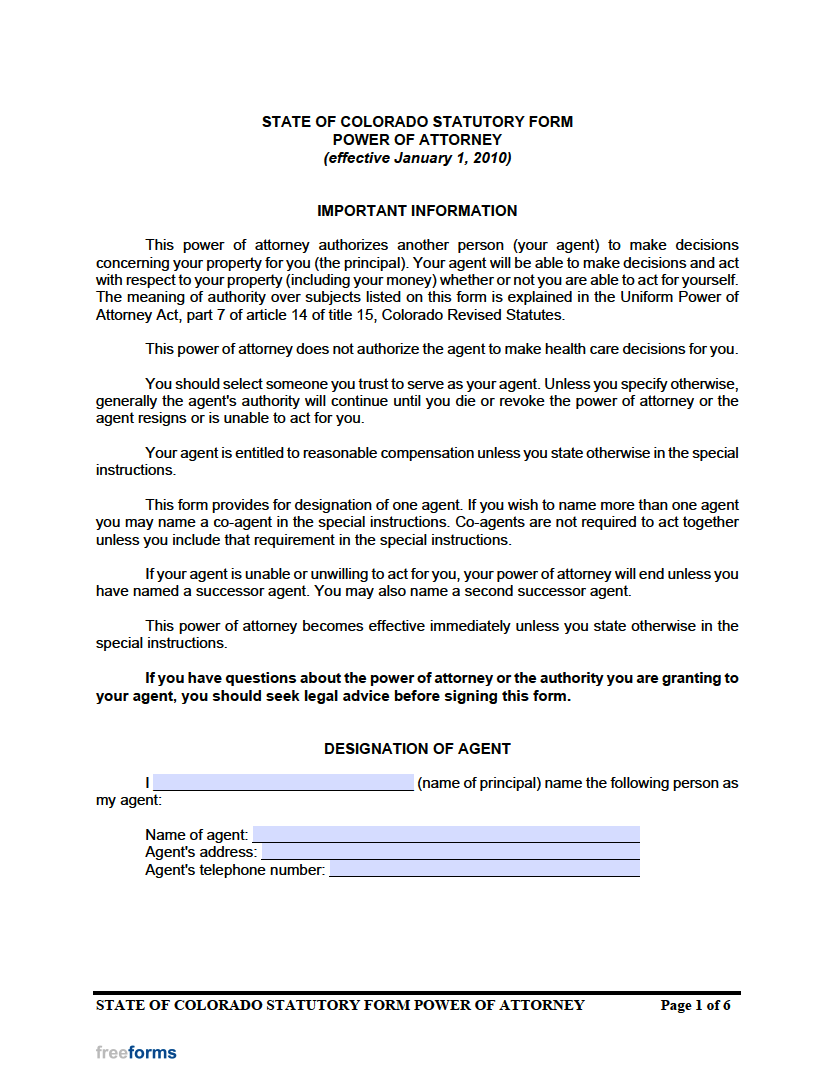The Colorado Power of Attorney permits an individual (known as the “principal”) to assign powers to a third party (known as the “agent”) so that they can function on their behalf. These powers can authorize individuals to perform various tasks in the principal’s name and vary depending on the type of POA executed. Some of the controls that may be delivered include:
- Financial (performing certain actions in the primary party’s name related to property, finances, taxes, etc.)
- Medical (making healthcare decisions for the principal if they ever become incapacitated)
- Parental (allows an agent to carry out various parental duties to properly care for the conveying party’s child)
After the principal has settled upon who they would like to appoint and what permissions will be transferred, the document will generally require that signatures occur in the presence of a notary public or two (2) acceptable witnessing parties, acknowledging that they indeed wish to make the conveyance.
Laws
Statutes – Colorado Revised Statutes – Uniform Power of Attorney Act (§ 15-14-701 – 15-14-745) and Colorado Revised Statutes – Declarations – Future Health Care treatment (§ 15-18-113 – 15-18.7-110)
Definition – “Power of attorney” means a writing or other record that grants authority to an agent to act in the place of the principal, whether or not the term power of attorney is used (§ 15-14-702(7)).
Signing Requirements – Acknowledgment of Notary Public is needed to properly instate the arrangement inherent in the contract (§ 15-14-705). Advance directives and living wills require verified corroboration of the document’s execution from either a licensed notary or two (2) approved witnesses (§ 15-18-106).
Revocation – § 15-14-710 and § 15-18-109
By Type (11)
- Advance Directive (Medical POA & Living Will)
- Durable (Financial) Power of Attorney
- General (Financial) Power of Attorney
- Limited (Special) Power of Attorney
- Living Will
- Medical Power of Attorney
- Minor Child Power of Attorney
- Motor Vehicle Power of Attorney
- Real Estate Power of Attorney
- Revocation of Power of Attorney
- Tax Power of Attorney
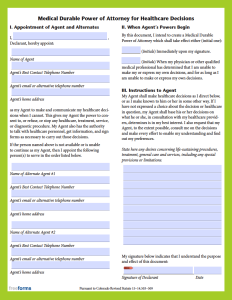 Advance Directive – This form fuses a living will and medical POA, which provides the user with the option of declaring their medical wishes and appointing an individual to make medical choices for them.
Advance Directive – This form fuses a living will and medical POA, which provides the user with the option of declaring their medical wishes and appointing an individual to make medical choices for them.
Download: PDF
Signing Requirements: The living will portion requires at least two (2) witnesses or one (1) notary public to view the principal’s signature (§ 15-18-106).
Durable (Financial) Power of Attorney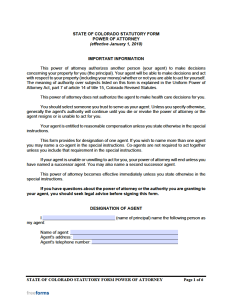 – Makes it possible to appoint multiple types of financial powers to another person and continues to remain active after the point of incapacitation.
– Makes it possible to appoint multiple types of financial powers to another person and continues to remain active after the point of incapacitation.
Download: PDF
Signing Requirements: Acknowledgment of Notary Public (§ 15-14-705)
General (Financial) Power of Attorney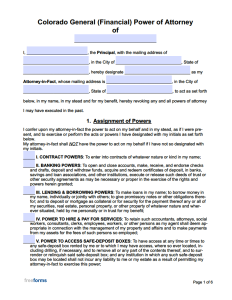 – Is almost interchangeable with the durable POA in terms of what powers can be granted, but it ceases to continue once the principal has lost their ability to operate mentally.
– Is almost interchangeable with the durable POA in terms of what powers can be granted, but it ceases to continue once the principal has lost their ability to operate mentally.
Download: PDF, Word (.docx)
Signing Requirements: Acknowledgment of Notary Public.
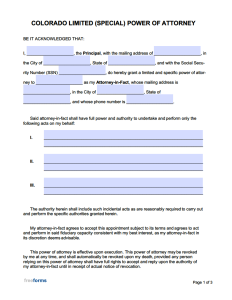 Limited (Special) Power of Attorney – A highly customizable POA that allows the principal to input their own description of the power they wish to grant.
Limited (Special) Power of Attorney – A highly customizable POA that allows the principal to input their own description of the power they wish to grant.
Download: PDF, Word (.docx)
Signing Requirements: Acknowledgment of Notary Public.
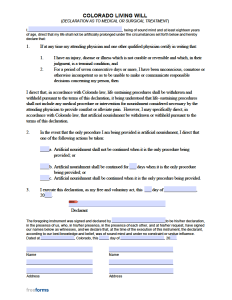 Living Will – Also referred to as a “Declaration as to Medical or Surgical Treatment”, this form lets the principal input their desired medical instructions should they be unable to express themselves in the future.
Living Will – Also referred to as a “Declaration as to Medical or Surgical Treatment”, this form lets the principal input their desired medical instructions should they be unable to express themselves in the future.
Download: PDF
Signing Requirements: Acknowledgment of Two (2) Witnesses (§ 15-18-106)
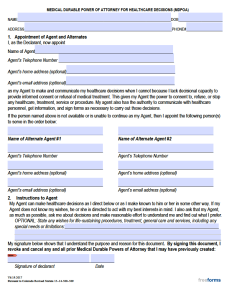 Medical Power of Attorney – Has the sole purpose of designating another party to make healthcare decisions on your behalf should you not be able to at a later date.
Medical Power of Attorney – Has the sole purpose of designating another party to make healthcare decisions on your behalf should you not be able to at a later date.
Download: PDF
Signing Requirements: Although not required, principals of this form are advised to sign in the presence of a notary public or two (2) witnesses.
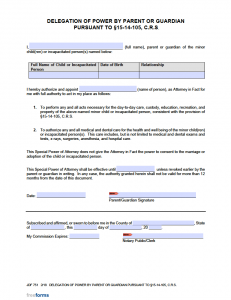 Minor Child Power of Attorney – Sanctions the conveyance of parental powers to another individual so that they can adequately care for the assigning party’s child for a temporary period of time (maximum of twelve (12) months).
Minor Child Power of Attorney – Sanctions the conveyance of parental powers to another individual so that they can adequately care for the assigning party’s child for a temporary period of time (maximum of twelve (12) months).
Download: PDF, Word (.docx)
Signing Requirements: Acknowledgment of Notary Public.
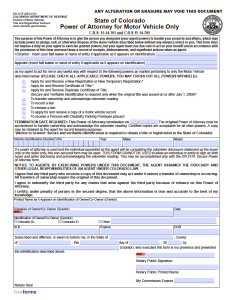 Motor Vehicle Power of Attorney – Transfers the right to buy, sell, title, or register a vehicle in the principal’s name with the use of this form.
Motor Vehicle Power of Attorney – Transfers the right to buy, sell, title, or register a vehicle in the principal’s name with the use of this form.
Download: PDF
Signing Requirements: Acknowledgment of Notary Public.
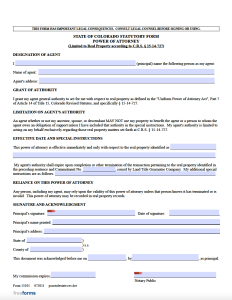 Real Estate Power of Attorney – Considered a limited/special type of POA, this instrument’s primary goal is to permit another individual to act on the principal’s behalf regarding real property.
Real Estate Power of Attorney – Considered a limited/special type of POA, this instrument’s primary goal is to permit another individual to act on the principal’s behalf regarding real property.
Download: PDF
Signing Requirements: Acknowledgment of Notary Public.
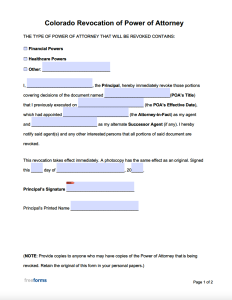 Revocation of Power of Attorney – Principal parties that wish to revoke the powers delivered in a previous POA may do so by fulfilling this document.
Revocation of Power of Attorney – Principal parties that wish to revoke the powers delivered in a previous POA may do so by fulfilling this document.
Download: PDF, Word (.docx)
Signing Requirements: It is recommended that a public official (or notary) notarize the form to ensure the document’s validity.
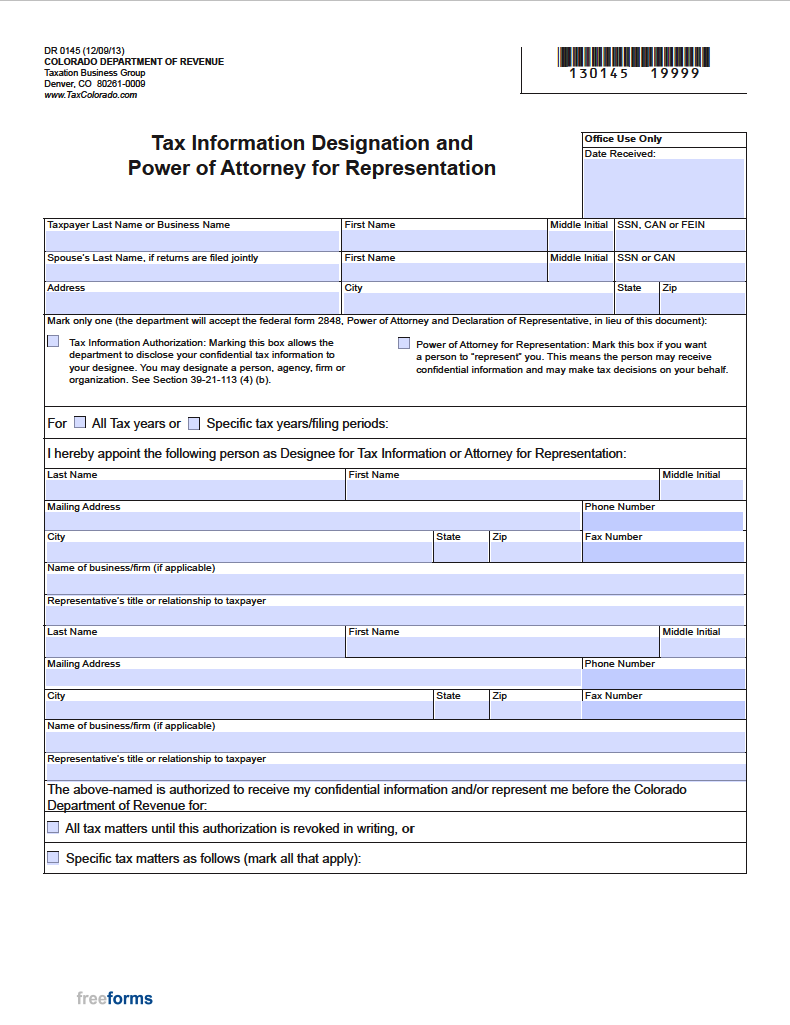 Tax Power of Attorney (Form DR 0145) – Expresses the conveyance of powers related to tax matters.
Tax Power of Attorney (Form DR 0145) – Expresses the conveyance of powers related to tax matters.
Download: PDF
Signing Requirements: Requires the principal party’s signature (as well as their spouse’s if applicable) and the endorsement of their representation.
